Home - Map - Prostate Cancer - Cycletouring - Highpath - EGGrings - Swing Crank - BROX - Cycle Tech - RISC OS
Until the 1980's most gear shifters were of the 'friction' type and didn't have clicks in them; riders had to change their gears by feel and could only tell how accurately this had been achieved by listening carefully. Today rear gears are 'indexed', which means that the shifters can only click into pre-defined positions. Thus modern gears have to be setup far more accurately if they are to work properly and the different parts of the system - sprockets, rear mech and shifter - must be designed to work together.
Contrary to misleading claims made by both Shimano and Campagnolo, it is not necessary for every part of your system to come from the same 'groupset'. Just four requirements must be met if it is to index properly:
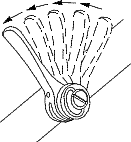
1. Your gears (your rear mech and shifter) must be matched, which usually means the same make and vintage, and they must be in good condition. Note, however, that you can use any make of rear freehub. (See below if you want to mix mechs and shifters from different manufacturers.)
2. Any inner and outer cable may be used as long as they are designed for indexed gears. They must be in good condition, free from kinks and move freely without passing round any tight corners. Squirt a little thin oil down all outer cables before assembly and on any cable guides such as those found under bottom brackets. And lubricate all the pivots in your rear mech while you're at it.
If these 2 requirements are met then the pitch of your rear mech (the distance it moves for each click of the shifter, except the first one) will be as follows:
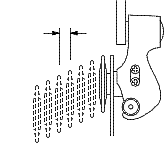
| rear mech and shifter (same make/vintage) |
pitch |
|---|---|
|
7 sp (all makes) |
5.00 mm |
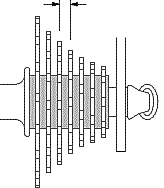
3. Your rear sprockets must be evenly spaced by the same distance (called the sprocket pitch). So, for example, a 7 speed cassette will index perfectly with Shimano 9 speed gears, even on a Campag hub, so long as its sprockets are 4.35mm apart (2 clicks will be redundant).
Highpath spacers can be used to respace most cassettes to any required sprocket pitch.
4. The last requirement is that everything is correctly adjusted according to the instructions which came with your rear mech and shifters.
Manufacturers are cautious with their specs and you may be able to push mechs further than they say. Maximise your rear mech's capacity by minimising the length of your chain - see Modern gears and chains.
You can use these 'drop handlebar' shifters with Campag or Shimano-compatible rear mechs by swapping an internal ratchet, as follows. The table shows which cassettes work with different combinations of Ergopower shifters and rear mechs. For example, 'Shim 8' means 'use a Shimano-compatible 8 speed cassette'.
Note
mod 4 : pitch of mech modified by turning its anchor-plate by 90° - method 4 below
x : non-standard pitch - respace your cassette with Highpath spacers
Adjustment : pull your gear cable tight enough to eliminate redundant clicks in top gear
| 8 sp Ergopower |
C20th 9 sp Ergopower |
C21st 9 sp Ergopower |
10 sp Ergopower |
11 sp Ergopower |
||
|---|---|---|---|---|---|---|
| rear mech: |
Shimano Shimano (mod 4) C21st Campag C20th Campag |
x all 6 x all 7, Camp 8 |
all 6 all 7, Camp 8 Shim 8 Camp 9 |
x Shim 8 Camp 9 Shim 9 |
Shim 8 Shim 9 Camp 10 Shim 10 |
Shim 9 Shim 10 Camp 11 x |
(With thanks to Chris Juden for his 'Shimergo' articles in the CTC magazine.)
The following tricks alter the pitch of a rear mech by changing the route the cable takes across its parallelogram. They are useful if you mix equipment from different makes and vintages.
1: Normal
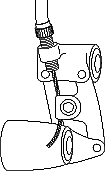
2: Wide pitch
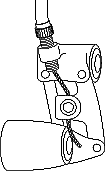
3: Wider pitch
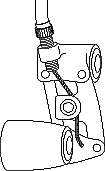
Clamping the cable on the wrong side of the anchor-bolt (3) results in more movement. If this is too much, drill a small hole through the bolt (not an easy task!) and thread the cable through that instead (2) .
4: Narrow pitch
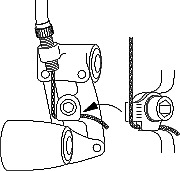
5: Adjustable
narrow pitch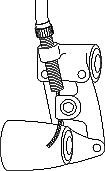
For less movement, turn the anchor-plate 90° and bend the cable around the outside of its bent tab. You may need to enlarge the plate's hole first or, if there isn't a tab, make your own bent plate instead (4) .
Replace the cable adjuster with a much longer one to make the pitch adjustable (5) . It is normal when the adjuster is fully out, less when halfway, and even less when screwed in all the way. (The adjuster now does two jobs - large changes affect the pitch but small changes continue to fine-tune the indexing as before.)
For even more possibilities you can combine a long adjuster (5) with one of the other methods (2, 3 or 4).
Remember that a rear mech shifts best when adjusted to be close to, but not touching, the rear sprockets. Its exact position can be adjusted by turning its hanger adjuster screw.